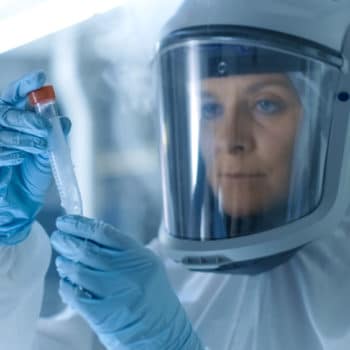Why We Love It
-
$76,230Potential Avg. Salary*
-
Growing DemandJob Outlook
* Salary & growth data is based on the recent Bureau of Labor and Statistics data published at https://www.bls.gov/oes/current/oes191022.htm for 19-1022 Microbiologists 11/2021. Based on national data, not school-specific information. Conditions in your area may vary.
If you enjoyed studying slides under a microscope in high school science classes and want to enjoy a career seeking to understand the organisms of life that can’t be viewed with the naked eye, you may want to consider pursuing a bachelor of science in microbiology.
Microbiologists study microorganisms, seeking to understand the basic components of life, or finding ways to prevent and eradicate disease.
What is a Degree in Microbiology?
Microbiology is the study of organisms that can only be viewed through the use of a microscope. Students studying for a bachelor of science in microbiology will learn how to use microscopic investigation to view the smallest organisms of human, animal, and plant life.
Bacteria, viruses, cells, mold, yeast, and fungi all fall under the purview of the microbiologist, who seeks to understand the behaviors of these organisms. With this understanding, microbiologists can seek to promote the growth or eradication of organisms.
If a microbiology program, you’ll take coursework in all of the basic sciences: biology, chemistry, physics, anatomy, and physiology. This coursework will prepare you to enter graduate school, which is needed for the majority of careers in this field.
After earning one or more graduate degrees, you’ll qualify for careers in the fields of pharmacology, molecular biology, molecular genetics, virology, and immunology. A microbiology degree also offers the education needed to succeed in medical school.
Recommended Schools
What Courses Would I Take For a Major in Microbiology?
- Cell Biology
- Microbial Physiology
- Immunology
- Bacterial Genetics
- Microbiology of Pathogens
- Microbes and Their Environments
- Animal Virology
- Biology of Microorganisms
What Jobs Can You Get with a Degree in Microbiology?
Within the field of microbiology, three disciplines are expected to see the highest numbers for job growth. First, microbiologists will be needed to help develop new medical treatments, immunizations, and pharmaceuticals to help prevent and treat disease.
Second, microbiologists will be in demand to assist with alternative energy research, finding uses for biofuels and biomass. Finally, microbiologists will be needed in agriculture to assist with the development of genetically engineered crops that resist disease and do not require the use of pesticides and other chemicals.
How Long does it take?
A bachelors in Microbiology will have a typical length of 4 years in a full time schedule. That said, there are many ways to speed up the timeframe by either taking more units via online coursework, community college, or taking free classes at OnlineDegree.com that could transfer to universities in the US.
Recommended Schools
Best Jobs for Microbiology Degrees
Microbiologists commonly find careers as researchers, research assistants, and research technologists for government, university, and private laboratories.
They conduct microorganism research for a variety of industries, including healthcare, pharmaceuticals, agriculture, and the animal and plant sciences. With graduate degrees, many microbiology graduates can also become doctors, veterinarians, and dentists.
How to save time and money
Our mission is to help you to avoid paying full price for college. We want your Microbiology degree to be affordable and accessible. Here’s how you could save:
Create Your Free SmartPlan

There are many ways to make college affordable and accessible.
That’s why we created a helpful tool called SmartPlan.
It’s free, and helps you find potential ways to save and tons of information about each school you’re considering
Think of it as your “college blueprint”, to help you instantly craft a path to your degree:
- Which Colleges Match Your Needs
- Ways You Could Save Time & Money
- Free Courses You Could Take for Credit
- Valuable Data and Insights on Each College
- Detailed Steps You Should Take!
See what’s possible for you and generate a free plan within just a few minutes
Create My SmartPlanYou Might also be Interested in
Many visitors who look for a degree in Microbiology are also interested in the following degrees.













